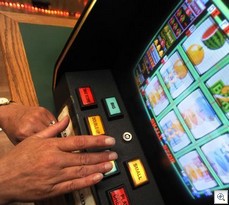 By the time the riverboat casinos of Iowa were in operation in 1991, the state of Illinois reacted to the notion that their citizens would be asked to cross the Mississippi River to gamble in another state. Illinois lawmakers feared that Iowa boats would simply become parasites upon the Illinois economy, taking both profits and tax moneys away from Illinois. Illinois knew gambling. Racetracks had been in operation since the days of the Depression. A lottery began selling tickets in 1972. Bingo games were very popular, especially in urban areas. Also, the state had considerable experience with illegal casino-type organizations. These forms of gambling would not be adequate to meet the marketing threat from Iowa.
By the time the riverboat casinos of Iowa were in operation in 1991, the state of Illinois reacted to the notion that their citizens would be asked to cross the Mississippi River to gamble in another state. Illinois lawmakers feared that Iowa boats would simply become parasites upon the Illinois economy, taking both profits and tax moneys away from Illinois. Illinois knew gambling. Racetracks had been in operation since the days of the Depression. A lottery began selling tickets in 1972. Bingo games were very popular, especially in urban areas. Also, the state had considerable experience with illegal casino-type organizations. These forms of gambling would not be adequate to meet the marketing threat from Iowa.
The Illinois legislature legalized riverboat casinos. They acted quickly, with legislation on the governor’s desk in January 1990 and the licensing process starting in February 1990. Ten licenses were authorized for the state, with each license holder being able to have two boats. Each boat would have a maximum capacity of 1,200 passengers. The boats would have to be on navigable waters; however, no boat could be inside of Cook County. This restriction was offered as a concession to the horse-racing tracks near Chicago, which is in Cook County. The tracks feared that the boats would have an unfair competitive edge over racing. In 1998 the restriction was removed, and a boat was authorized for the community of Rosemont.
The casino operations began in April 1991, just after Iowa boats began operations. The Illinois lawmakers decided to meet the threat of Iowa competition by offering more “liberal” gaming rules. There was no $5 bet limit, nor was there a $200 loss limit per cruise. The boats were required to make cruises, unless there was bad weather. In such a case there would be “mock cruises”, with players entering and leaving the dockside boat at set times. The Illinois boats did very well compared to the Iowa boats in their first years of operation. Therefore, Iowa felt the necessity of eliminating its $5 betting and $200 loss limits in 1994.
Well before the advent of riverboat casinos, there were efforts to bring legal casino gambling to Illinois. During the Prohibition and World War II eras, there were several illegal gambling halls in the state; however, their numbers and the openness of their operations declined in the 1950s and 1960s. Instead, an effort grew to legalize casinos.
In the late 1970s Mayor Jane Byrne suggested having casinos to produce extra revenues for snow removal activities in Chicago. The Navy Pier site was selected for casino gambling. The efforts were stymied by Springfield lawmakers. In 1992 Chicago mayor Richard Daley conferred with several Las Vegas operators, and together they proposed a $2 billion megaresort complex for the city. The project engendered considerable support; however, it was defeated owing to the opposition of Gov. James Edgar.
The Illinois riverboat casinos are regulated by a five-member Illinois Gaming Board appointed by the governor. The board issues licenses, collects taxes, and enforces gaming rules with inspections, hearings, and fines as necessary. The board may also revoke licenses. The boats pay license application fees of $50,000 each. After operations begin, they pay an admission tax of $2 per passenger and also pay 20 percent of their gaming win (players’ losses) as a state tax. Half of the admissions tax and one-fourth of the gambling tax are returned by the state to the local city or the county where the boat is docked. Each boat has a single docking site. The ten boats have generated over $1.2 billion a year.
|
|